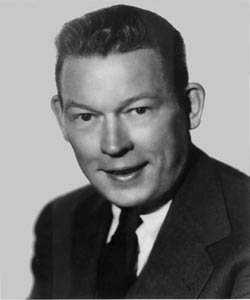 SKC Films Library SKC Films Library |
|
|
| SKC Films Library >> Linguistics,
Languages, and Literatures
>> Dramatic
Arts >> Biography: United States |
 Fred Allen Fred Allenradio personality John Florence Sullivan was born in Cambridge, Massachusetts, on May 31, 1894. As a youngster he taught himself the basics of comedy and juggling by reading books, and began working on vaudeville as "The World's Worst Juggler" while still a teenager. In 1920, he changed his professional name to Fred Allen and left vaudeville to appear in several musical shows, including The Passing Show of 1922 and The Greenwich Village Follies. It was while working in The Passing Show that he met Portland Hoffa, a chorus girl, whom he married in 1928. Allen made his radio debut on October 23, 1932, on the CBS Radio Network program The Linit Bath Club Review (named for its sponsor); the show moved to NBC Radio in 1933. After this show came The Salad Bowl Revue (1933), The Sal Hepatica Revue (1933-1934), and The Hour of Smiles (1934-1935). The program that would make Allen a long-time radio personality premiered in 1935 as Town Hall Tonight, a one-hour show that featured appearances by celebrities, musical numbers, and social commentaries on a wide variety of topics, including criticism of the advertising and radio industries. By 1936 Allen had a weekly audience of about 20 million listeners. "Allen's Alley," a weekly segment within Town Hall Tonight, made its debut on December 6, 1942. Basically a series of comedy routines, "Allen's Alley" introduced a few radio characters that would go on to inspire well-known television characters -- Titus Moody later turned up as the Pepperidge Farm cookie man and Senator Claghorn became the Warner Brothers cartoon character Foghorn Leghorn, just to name a couple. Unlike most other radio personalities of the day, Allen did not have a room full of writers creating scripts, preferring to do most of the writing himself. To get material he regularly read up to nine newspapers a day, and he frequently spent 12 to 14 hours a day writing and re-writing scripts. He did, however, employ a few assistants, some of whom went on to become famous in their own right -- Herman Wouk went on to pen The Caine Mutiny and The Winds of War, and Nat Hiken went on to create The Phil Silvers Show for television. Poor health forced Allen off the air in 1944, but he returned in 1945 with The Fred Allen Show, which essentially had the same format as Town Hall Tonight. By the 1946-1947 season Allen had the number one show on network radio, but it proved to be the beginning of the end. The new medium of television was beginning to gain popularity, and many long-time radio sponsors were jumping ship to get in on the new market. This, combined with Allen's almost continuous feuding with his own sponsors, finally led to his leaving radio, and The Fred Allen Show aired for the last time on June 26, 1949. Allen never made a secret of the fact that he cared very little for television, but he did make a few attempts in the media. He made seven appearances on the Colgate Comedy Theater, but his brand of comedy didn't seem to translate well to television. His next attempt was Judge For Yourself (1953-1954), a quiz show in which he was supposed to carry on witty ad libbed conversations with guests. Next came Fred Allen's Sketchbook (1953), which featured a puppet show version of his infamous "Allen's Alley" skits; the transition never really worked. He was last seen on television as a regular panelist on the show What's My Line? (1955-death). Fred Allen died in New York City on March 17, 1956. In addition to his work on radio
and television, Allen also appeared in the following
films: Allen was the author of two autobiographical works: Treadmill to Oblivion (1954), deals with his experiences in radio, while Much Ado about Me (1956), with his vaudeville days. Fred Allen was inducted into the Radio Hall of Fame in 1988. WEB SOURCES SEE ALSO |
SKC Films Library >> Linguistics, Languages, and Literatures >> Dramatic Arts >> Biography: United States This page was last updated on 03/16/2017. |